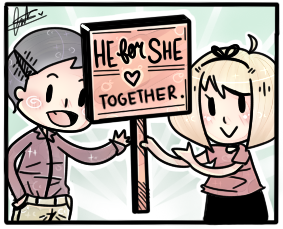Emma Watson: From House-Elf Rights to Gender Equality
JANET GUAN
Copy Editor
It is difficult to find a person who has not heard of Emma Watson. Widely known for her role as Hermione Granger in the blockbuster Harry Potter movie series, Watson has been active in other areas as well, including other major movie roles and obtaining her bachelor’s degree in English literature from Brown University. More recently, she was appointed as a UN Women Goodwill Ambassador and delivered a speech at the UN Headquarters in New York City concerning the UN Women’s “HeForShe” campaign. She makes multiple valid points regarding feminism and, as a public figure, does well in persuading her audience.
Among the first issues she addresses in the beginning of her speech are the misconceptions behind the definition of feminism.
“I was appointed six months ago [as a UN Women Goodwill Ambassador] and the more I have spoken about feminism the more I have realized that fighting for women’s rights has too often become synonymous with man-hating,” Watson said. According to Watson, the definition of feminism is the belief that men and women have equal rights and opportunities — that political, economic and social equality exists among the sexes. Feminism’s meaning could very well be the definition of gender equality. However, the idea of female empowerment still exists because gender equality does not exist, and women, in particular, have received the short end of the stick.
Along with misconceptions, Watson also brings up the negative effects of gender stereotypes. In her speech, Watson not only ties in her personal experience, but also the male perspective as well. Female friends were pressured to not look muscular or anything consistent with being manly; male friends were pressured to hide their insecurities or anything consistent with being girly. Not only are these stereotypes further enforcing a gap between genders, but they also force people to emulate a gender-specific image instead of expressing their true interests. These pressures are detrimental and contribute to extreme mental illnesses. Many may develop eating disorders to change their body and even attempt suicide, because they do not fit in with what society expects of them, when society itself should change its expectations.
Last, but definitely not least, Watson addresses the main point for the “HeForShe” campaign — men need to be feminists too. Women can do their part by fighting against inequality, but if the oppressor continues to oppress, no progress will be made. Without any action taken, unequal wages, child marriage and unequal education will continue. Men and women will continue to be boxed into dehumanizing stereotypes. In order for change to occur, both parties need to take part.
